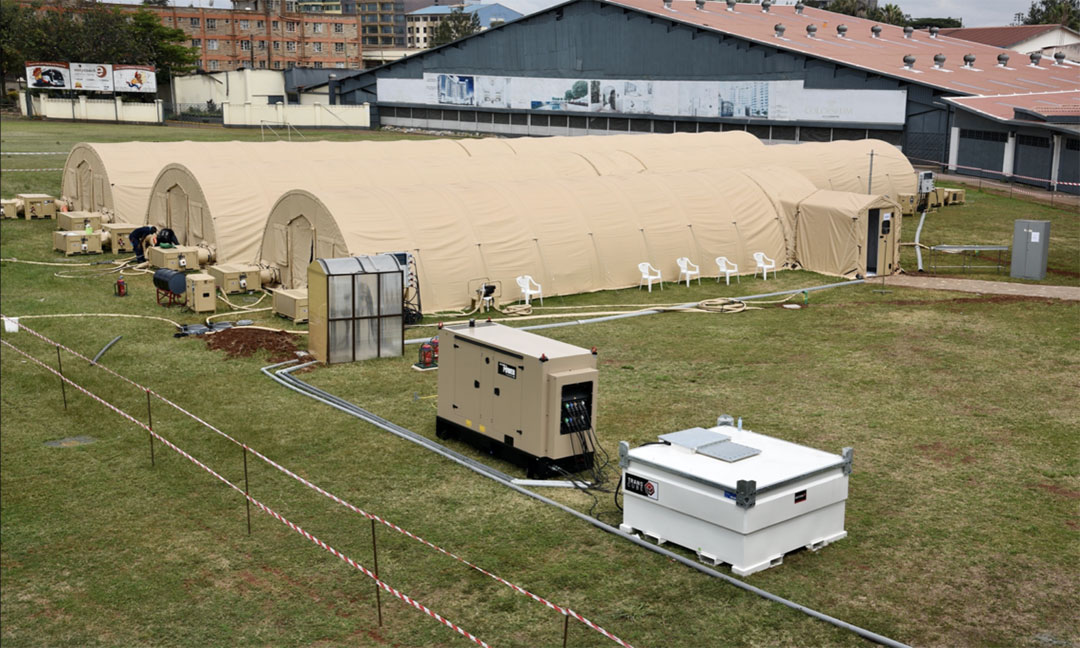Kenya’s Border Police Receive Mobile Field Hospital as Pandemic Grows
ADF STAFF
The U.S. delivered a negative air pressure mobile field hospital to the Kenya National Police Border Unit as the nation confronted a deadly surge in COVID-19 cases.
The portable 40-bed facility can be transported rapidly and assembled in remote locations. Its negative-pressure rooms ensure that patients in any condition receive medical care, including surgeries, without risk of contaminated air flowing out. Delivered in mid-November, the hospital initially will be staged at Aga Khan University Hospital in Nairobi, according to U.S. Africa Command (AFRICOM).
“This donation will help address the COVID pandemic in the near term but will continue to benefit the region post-COVID for years to come,” said Maj. Gen. John Wood, U.S. Africa Command’s (AFRICOM) director of Strategy, Engagement and Programs. “This act is one of several ways [AFRICOM] and our Kenyan partners are working together to enhance regional long-term stability.”
After the pandemic, the mobile field hospital will be moved to a Border Police Unit location for maintenance and be deployed in border communities with limited health care. It will be staffed by Kenyan medical professionals with support from AFRICOM and a Massachusetts National Guardsman, who will be the facility’s control officer.
“This is a true example of what public and private partnership can accomplish between two countries in a time of crisis,” said Lt. Col. Matthew E. Kopp, chief of the U.S. Army’s Office of Security Cooperation.
The hospital is valued at 173 million Kenyan shillings ($1.6 million). Since March, the U.S. has donated an additional 7.6 billion Kenyan shillings (nearly $70 million) to Kenya’s COVID-19 response through equipment, testing, training and research, as well as by supporting health, clean water, sanitation, education, employment and food security.
Earlier in November, the U.S. delivered 14 ventilators to help treat seriously ill COVID-19 patients at Coast General Teaching and Referral Hospital in Mombasa. Ventilators help patients breathe by moving oxygen in and out of their lungs through a tube inserted in their airway. The U.S. has pledged to deliver 200 ventilators to Kenya, which had just 189 ventilators in June.
Delivery of the mobile field hospital coincided with a spike in COVID-19 infections in Kenya. Between November 1 and November 16, the country recorded nearly 15,000 COVID-19 cases, according to The Standard, a Kenyan newspaper.
Amid the surge, Kenyan Health Minister Mutahi Kagwe met with emergency response and medical leaders. He urged counties to take stock of oxygen supplies and personal protective equipment for health care workers and to work closely with the government to better disseminate information about the outbreak.
Kagwe also chastised the public for failing to wear masks and practice social distancing at large gatherings such as weddings and funerals.
“We appeal to the police and other enforcement agencies to implement the laid-down protocols given as far as these gatherings are concerned,” Kagwe said in The Standard’s report. “These are not normal times.”
As of December 6, Kenya had logged 88,380 cases and 1,526 deaths, according to the Africa Centres for Disease Control and Prevention. Authorities worried that the situation would further deteriorate through December.
“This will not be a normal festive period, and the risks of transmission remain very real,” Patrick Amoth, director general of the Ministry of Health, told the Daily Nation. “Even if it means meeting as a family on Zoom, please do stay and remain safe.”


Comments are closed.